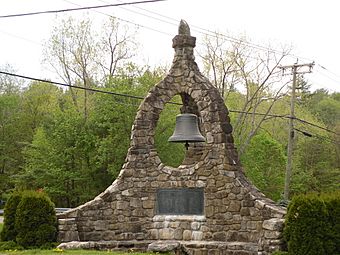World War I Memorial (Norfolk, Connecticut) facts for kids
Quick facts for kids |
|
|
World War I Memorial
|
|
 |
|
| Location | Greenwoods Rd. West and North Sts., Norfolk, Connecticut |
|---|---|
| Area | 0.1 acres (0.040 ha) |
| Built | 1921 |
| Architect | Taylor, Alfredo, S. G. |
| Architectural style | Rustic |
| MPS | Taylor, Alfredo S. G., TR |
| NRHP reference No. | 84001106 |
| Added to NRHP | February 17, 1984 |
The World War I Memorial in Norfolk, Connecticut is a special monument. It stands in the middle of the town's center. This memorial was built in 1921. It was designed by a famous architect named Alfredo S.G. Taylor. The memorial was added to the National Register of Historic Places in 1984. This means it is an important historical site.
About the World War I Memorial
The World War I Memorial is located where Greenwoods Road West and North Street meet. This spot is in the northern part of Norfolk's village center. The memorial is made from a type of stone called granite. It stands about 15 feet (4.6 meters) tall.
What Does the Memorial Look Like?
The monument has a unique triangular shape. Each of its three sides rises up to a point at the top. Hanging beneath this peak is a copy of the Liberty Bell. Bronze plaques are placed on each curved side of the monument. These plaques honor the soldiers from Norfolk who served in World War I. There are also stone benches built into the memorial.
Who Designed This Memorial?
The memorial was designed by Alfredo S.G. Taylor. He was an architect from New York City. Taylor spent many of his summers in Norfolk. He designed more than thirty buildings in the town. These included public buildings, shops, and many homes.
The memorial was officially opened in 1921. Its style fits well with Taylor's other designs. He often used stone and a "rustic" look. This means it looked natural and a bit rough, like it belonged in the countryside.
When the town asked him to design the memorial, they had four main ideas:
- It needed to be big enough to show the power of war.
- It should not need a statue.
- It had to be made from materials found nearby.
- It should be simple enough for the families of the soldiers to help build.
 | Laphonza Butler |
 | Daisy Bates |
 | Elizabeth Piper Ensley |



